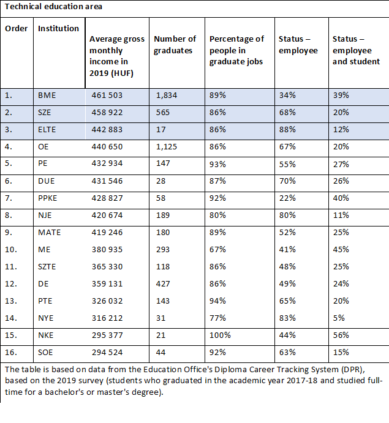This article was published in the UNI 2022 summer edition.
Bachelor’s degree courses:
Unbranched master’s degree
Within the technical field, there are 26 bachelor’s degrees and 1 master’s degree. The highest average monthly gross salary is in
based on 2019 data. Depending on the subject, those interested in the field of study can choose from several higher education institutions, including those in the capital and in rural areas.

Photo: 123RF
Average salary after graduation is taken as the ranking indicator.

Average gross monthly income of technical graduates in the 2017/18 academic year (based on 2019 data) is close to HUF 428,000, but there are significant differences between institutions. Looking only at full-time students, the highest salaries were paid to BME graduates, who earned more than HUF 461,000 per month. In terms of average gross monthly income, SZE came second with nearly HUF 459,000, while ELTE came third with HUF 443,000.
On average, 81% of graduates in a bachelor’s degree in a field of study start working within 1.6 months after graduation. 88% of them manage to find a graduate job, and four institutions (PE, PPKE, PTE, SOE) have a very high rate of over 90%, while all graduates of NKE have a graduate job.
Around 31% of people in initial education and training decide to continue their studies after graduation. This is most common for graduates from NKE (56%), ME (45) and PPKE(40).
The average gross monthly income of BME graduates is nearly HUF 462,000, putting the institution at the top of our ranking of education areas in terms of expected graduate salaries after graduation. A very high proportion of students (89%) go on to graduate work after graduation. In terms of student numbers, BME is the most significant point in the engineering field, with 1 834 students graduating in the period under review.
The average gross monthly income of graduates from SZE was HUF 459,000, putting the university in second place in the ranking of education areas. A very high proportion of graduates (72%) have a graduate job. On average, graduates are also in work within 1.1 months of graduation, with a very high proportion (86%) in graduate jobs.
The average gross monthly income of graduates from ELTE is close to HUF 443,000, putting the institution in third place in the ranking of education areas. After graduation, a high proportion of graduates (86%) have a graduate job.
A relatively high proportion of graduates with a bachelor’s degree in engineering have studied abroad (e.g. under Erasmus) during their studies: 6%. During the training (before graduation), 64% of students had a professional job and about the same proportion of students (67%) who (also) did a non-professional job.
After graduation, graduates mainly find a job and/or continue their studies in Budapest (35%) or County Pest (11). After finishing their bachelor’s degree, 93% start working in the private sector, with only around 5% of graduates taking a job in the public sector and 2% in non-profit or other employment. The proportion of graduates in the field of education who are employed in the labour market is high (92%). Overall, graduates in technical education are generally satisfied with their jobs (83%).